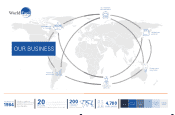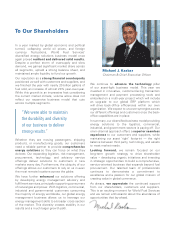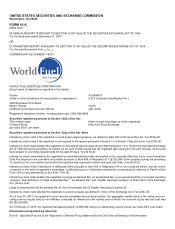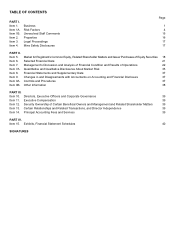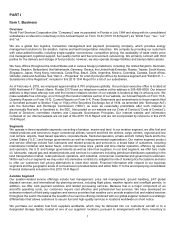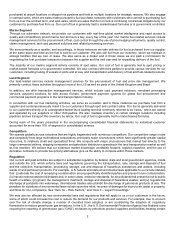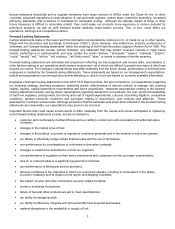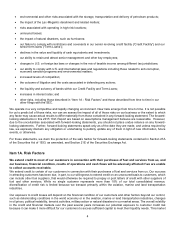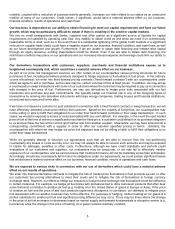World Fuel Services 2015 Annual Report Download - page 10
Download and view the complete annual report
Please find page 10 of the 2015 World Fuel Services annual report below. You can navigate through the pages in the report by either clicking on the pages listed below, or by using the keyword search tool below to find specific information within the annual report.5
volatility, coupled with a reduction of business activity generally, increases our risks related to our status as an unsecured
creditor of many of our customers. Credit losses, if significant, would have a material adverse effect on our business,
financial condition, results of operations and cash flows.
Our business is dependent on our ability to obtain financing to meet our capital requirements and fund our future
growth, which may be particularly difficult to obtain if there is volatility in the credit or capital markets.
We rely on credit arrangements with banks, suppliers and other parties as a significant source of liquidity for capital
requirements not satisfied by operating cash flow. Any inability to obtain credit as and when we need it on commercially
reasonable terms or at all, such as in the event there is a substantial tightening of the global credit markets or a significant
reduction in supplier trade credit, could have a negative impact on our business, financial condition, and cash flows, as well
as our future development and growth. Furthermore, if we are unable to obtain debt financing and instead raise capital
through an equity issuance, existing shareholders would be diluted. Even if we are able to obtain debt financing, the
restrictions creditors may place on our operations and our increased interest expense and leverage could limit our ability to
grow.
Our derivatives transactions with customers, suppliers, merchants and financial institutions expose us to
heightened counterparty risk, which could have a material adverse effect on our business.
As part of our price risk management services, we offer certain of our counterparties various pricing structures for future
purchases of fuel, including derivatives products designed to hedge exposure to fluctuations in fuel prices. In the ordinary
course of business, we enter into fixed forward pricing contracts (“fixed forward contracts”) with our counterparties under
which we agree to sell or purchase, as the case may be, certain volumes of fuel at fixed prices. In addition, we may act as
a counterparty in swap transactions with some of our customers where the customer may be required to pay us in connection
with changes in the price of fuel. Furthermore, we may use derivatives to hedge price risks associated with our fuel
inventories and purchase and sale commitments. We typically hedge our financial risk in any of the foregoing types of
transactions by entering into derivative instruments with large energy companies, trading houses and financial institutions,
on secured and unsecured terms alike.
If we have not required a customer to post collateral in connection with a fixed forward contract or swap transaction, we will
have effectively extended unsecured credit to that customer. Based on the volatility of fuel prices, our counterparties may
not be willing or able to fulfill their obligations to us under their fixed forward contracts or their swap transactions. In such
cases, we would be exposed to losses or costs associated with any such default. For example, in the event the spot market
price of fuel at the time of delivery is significantly less than the fixed price, a customer could default on its purchase obligation
to us and purchase the fuel at the current spot market rate from another supplier. Meanwhile, we may have entered into a
corresponding commitment with a supplier in order to offer our customer specified pricing or terms. Similarly, the
counterparties with whom we may hedge our price risk exposure may not be willing or able to fulfill their obligations to us
under their swap transactions.
While we generally attempt to structure our agreements such that we are able to recover from the non-performing
counterparty any losses or costs we may incur, we may not always be able to recover such amounts and may be exposed
to claims for damages, penalties or other costs. Furthermore, although we have credit standards and perform credit
evaluations of our customers and suppliers, our evaluations may be inaccurate, or we may fail to effectively monitor
exposure of our counterparties, and we cannot ensure that credit performance will not be materially worse than anticipated.
Accordingly, should any counterparty fail to honor its obligations under our agreements, we could sustain significant losses
that would have a material adverse effect on our business, financial condition, results of operations and cash flows.
We are exposed to various risks in connection with our use of derivatives which could have a material adverse
effect on our results of operations.
We enter into financial derivative contracts to mitigate the risk of market price fluctuations in fuel products we sell, to offer
our customers fuel pricing alternatives to meet their needs and to mitigate the risk of fluctuations in foreign currency
exchange rates. However, our efforts to hedge our exposure to fuel price and exchange rate fluctuations could be ineffective
in certain instances. For example, we hedge jet fuel prices with derivatives tied to other petroleum products that often bear
some historical correlation to aviation jet fuel (e.g. heating oil in the United States or gasoil in Europe or Asia). If the price
of aviation jet fuel and the price of any such products experience divergence in correlation, our attempts to mitigate price
risk associated with our aviation business may not be effective. For purposes of hedging, neither heating oil nor gasoil is a
perfect substitute for aviation jet fuel and significant pricing differences may occur. There may be times where the change
in the price of jet fuel increases or decreases based on market supply and demand fundamentals or disruptive events (e.g.
hurricanes) while the change in the price of heating oil or gasoil remains relatively constant.


